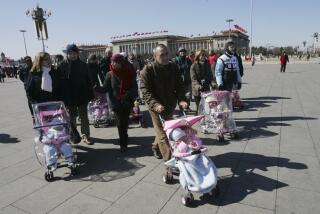China Confronts Its Daunting Gender Gap
- Share via
BEIJING — When China celebrated the birth of its 1.3 billionth person early this month, officials hailed the draconian family planning policies that have succeeded in slowing down the birthrate in the world’s most populous nation.
Much to no one’s surprise, China’s new arrival was male. For nearly three decades, the government has limited couples to one child, a move that has resulted in 300 million fewer people and one daunting gender gap.
Selective abortions and female infanticide have thrown the natural order out of whack. The latest official figures indicate that in China, about 119 boys are born for every 100 girls, and in some rural areas, the difference is 133 to 100. Under normal circumstances, the ratio would be 106 boys to 100 girls.
In response, the central government is expected to criminalize selective abortion, including the use of gender detection for the purpose of aborting an otherwise healthy girl. No details have been given. The government’s goal is to help normalize the country’s gender ratio by 2010.
“The government takes it as an urgent task to correct the gender imbalance of newborns,” Zhang Weiqing, minister in charge of the State Population and Family Planning Commission, told state media recently.
Family planning laws already forbid the termination of a pregnancy because of gender.
Doctors performing ultrasound examinations are not allowed to tell expectant parents whether the fetus is male or female. But in a country where boys are prized for carrying on the family name and providing for their aging parents, people have ways of finding out.
“All it takes is a glance of the eye or a gesture of the hand from the doctor,” said Xu Anqi, a sociologist at the Shanghai Academy of Social Sciences.
“It’s impossible to stop them from revealing the sex of the fetus.”
Abortions have been relatively easy to obtain. Violating the one-child policy has meant heavy fines and the loss of jobs and benefits, so doctors rarely question an unwanted pregnancy.
“You can say, ‘It’s my second pregnancy,’ ‘I’m too busy with work’ or ‘I don’t have enough money to raise a child.’ Most hospitals will just take your word for it,” Xu said.
Some critics worry that outlawing gender detection and selective abortion will drive those who perform them further underground, making the procedures more expensive and risky.
The critics also believe that as long as the one-child policy exists, women, especially those in rural areas, will be under pressure to have boys. If selective abortion is illegal, more women might resort to killing their infant daughters. Female infanticide is already widespread in rural areas that lack access to ultrasound technology.
The Bush administration has withheld funding from the United Nations Population Fund to protest the agency’s support of China’s one-child policy.
Balancing the gender gap is considered crucial to the country’s social stability.
With an estimated 40 million more men than women in the population, China risks becoming a nation of bachelors. Already, trafficking of women and children is on the rise because men fear growing old without a mate.
Critics say it’s difficult to end the gender ratio imbalance without addressing the root cause of the gender preference.
“Criminalizing selective abortion may work as a short-term deterrent, but in the long term we need to improve the living conditions of women, increase their education and economic opportunities and provide more social security coverage for the elderly,” said Lu Jiehua, a population studies expert at Peking University.
Already, a more developed urban China is experiencing plummeting birthrates, just like other industrialized countries. The government has responded by allowing city dwellers who are themselves an only child to have two children.
People living in the countryside are allowed to have a second child if the first-born is a girl. Instead of punishments such as destroying the homes of those with too many children, some provinces offer financial incentives for rural residents to have smaller families.
But the desire to have a baby boy remains strong.
The main reason the Chinese prefer sons is the lack of a social safety net.
The vast majority of Chinese live in the countryside, and they have no health insurance or pensions. Daughters marry and move away, whereas sons traditionally stay home and support their aging parents.
The nation’s elderly population is expected to quadruple by 2050 to nearly 400 million. Supporting this ballooning group poses a serious challenge to a shrinking youth population and the country’s limited social security system.
China’s population explosion began in the 1960s: The number of people rose from 600 million during the nation’s first census in 1953 to 700 million about a decade later. The first man to warn Beijing of an impending demographic crisis was purged.
The population grew unchecked until 1970, when it reached about 800 million.
By the late 1970s, the family planning policy had begun to kick into gear.
The Chinese birthrate dropped from 5.8 per woman in 1970 to less than 2 in 2000, according to state figures.
More to Read
Sign up for Essential California
The most important California stories and recommendations in your inbox every morning.
You may occasionally receive promotional content from the Los Angeles Times.










